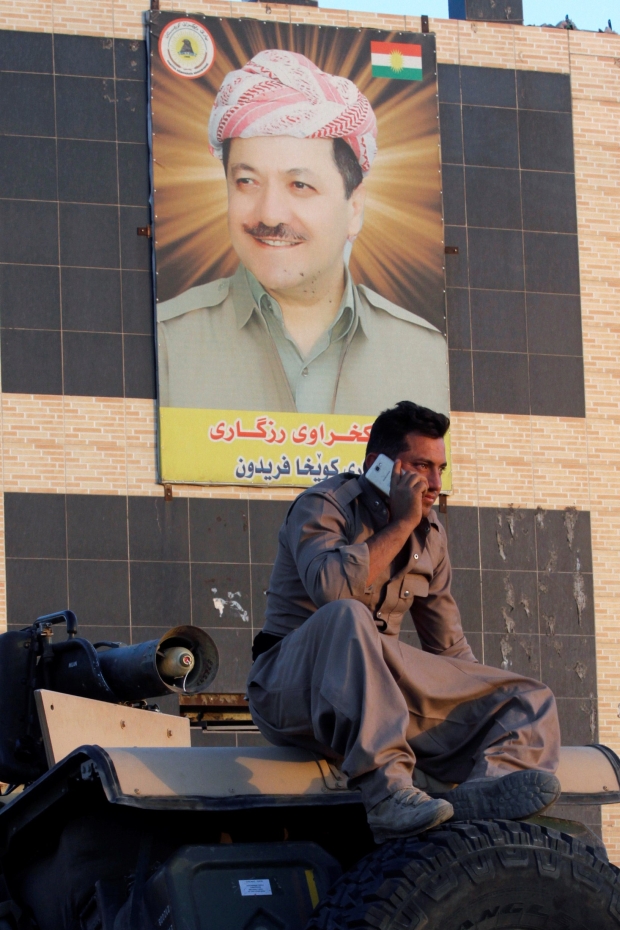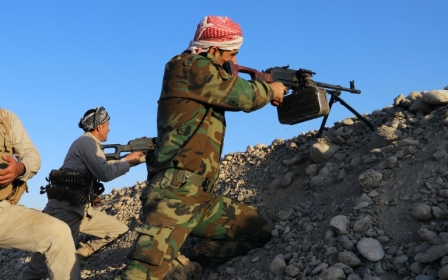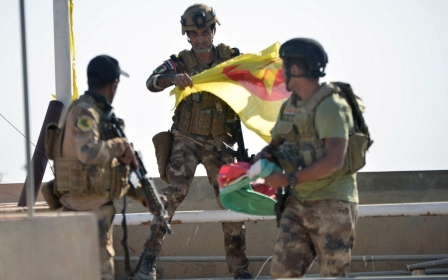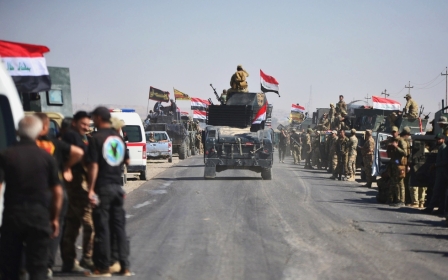In the aftermath of Kirkuk: Violence, betrayal, and defeat
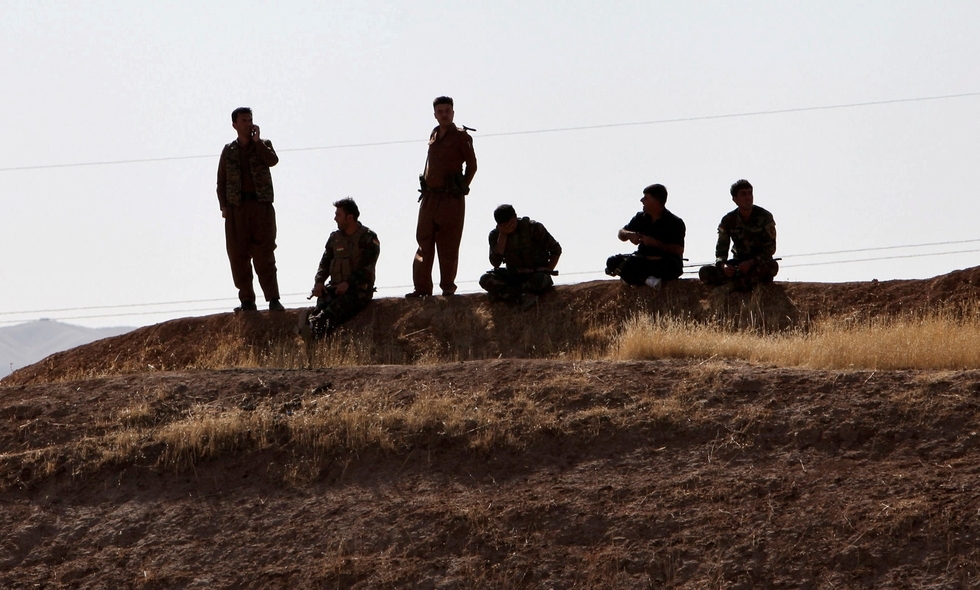
Most Kurds believe that desertion by friends at times of need is not new. Given a history full of broken trust, this wounding feeling was evoked once again, when, in the aftermath of the Kurdish vote for independence, the Iraqi state used force to seize 40 percent of the Kurdish-controlled territory, as the world watched in silence.
Despite the international community’s stand against the Kurdish referendum, ordinary Kurds believed that they would be protected from state violence. However, emboldened by Western support, Iraqi Prime Minister Haidar al-Abadi seized the opportunity to forcibly regain control of the oil-rich "disputed territories" - which came under Kurdish control in 2014 when the Iraqi army withdrew in the face of Islamic State (IS) attacks - without negotiating with the Kurdistan Regional Government (KRG).
Loyal ally
Abadi deployed the Popular Mobilisation Units (PMUs) and utilised the heavy weaponry supplied to him by the West to fight IS. Given the controversial reputation of the PMUs, their arrival terrified the public. The images of civilians fleeing in their thousands re-traumatised the Kurds, reminding them of Saddam Hussain's genocidal attacks.
The prevailing Kurdish sentiment is that being a loyal ally of the West has led to no good. The Kurdish saying Nimekman swere ("Our bread is salty"), addresses just this kind of situation: "No matter how gracious and generous we are to our friends, they are never loyal to us."
The peshmarga's withdrawal from Kirkuk and other areas, leaving vulnerable civilians behind, has caused huge resentment.
A more dangerous view is held by some of the younger generation: "We can be easily abandoned because we have not resorted to terrorism. If we had, we would be taken seriously."
The feeling of being dispensable and repeatedly betrayed breeds anger and radicalisation, sentiments that the West should take seriously, given its history of being haunted by past mistakes and injustices.
But feeling forsaken by one's own people adds another level of desperation to the Kurdish experience. In 1988, when the Iraqi state deployed gas weapons during the Anfal genocide, the peshmarga forces could not protect civilians who were left to face the wrath of the central state alone.
In August 2014, when IS attacked Sinjar, the withdrawal of the peshmarga forces and the subsequent genocide of the Yazidi community is another national wound.
More recently, the peshmarga's withdrawal from Kirkuk and other areas, leaving vulnerable civilians behind, has caused huge resentment.
PUK unilateral retreat
Despite the initial confusion, it seems clear that the Patriotic Union of Kurdistan’s (PUK) made a deal with Baghdad, when 38 senior PUK officials signed the agreement. This deal was brokered by Iran. Even though the PUK argues that Barzani’s Kurdistan Democratic Party (KDP) was a party to this agreement, the KDP denies this and accuses PUK of betrayal.
Persuaded or pressurised by Iran's Qassem Soleimani, commander of the Quds force, the PUK forces were first to withdraw from Kirkuk on 16 October. Images of people begging the peshmarga not to abandon them left many crying, feeling ashamed and gravely wronged.
The decision not to fight the Iraqi state - in possession of a large army, superior weapons and international support- would have been wise if it was made by both the PUK and Massoud Barzani’s Kurdistan Democratic Party (KDP).
This sense of national defeat is heightened by the fact that it comes soon after anticipation of independence
Had they done so, there would have been a less violent takeover by the state. It would have also saved the lives of the peshmarga and the civilians who were enthused to fight by these same parties. As it stands, the PUK's decision to retreat unilaterally (a consequence of party-affiliated peshmarga forces rather than a united force) was deceitful, to say the least.
This experience reminds the community of the KDP's deal with Saddam Hussain in August 1996, which helped push the PUK out of Erbil.
It also reminds them of the 1975 Algiers Accord, where Iran and Iraq came to an agreement and, with compliance from the US, crushed the Kurdish resistance. This sense of national defeat is heightened by the fact that it comes so soon after anticipation of independence.
Better leadership
The way the situation unfolded also means that the hope for a unified and democratic Iraq, if there was ever such a hope, is now lost.
Widely circulated images of the Kurdish flag being dragged on the floor and stepped and spat on, the sneering and racist remarks emanating from Arabic media channels, alongside rumours of Kurdish homes being burnt to the ground, bodies of peshmerga flattened by advancing tanks, women being raped, and people prevented from speaking their mother tongue, have wounded the Kurdish psyche in ways that will take a long time to heal.
The conflict will continue until better leadership on both sides can take it to a more peaceful resolution
Even though it was unwise that the KRG held a referendum without securing regional or international support, it was equally unwise that the Iraqi federal government punished the public for expressing their wish in a peaceful manner.
As Einstein said: "insanity is doing the same thing over and over again, but expecting different results." The federal government, like previous Iraqi governments, has once again resorted to violence to suppress Kurdish demands. It is insanity to expect that, this time, this violence will have a different result, helping to create a conflict-free Iraq.
History shows that this "problem" will not be solved by force. The conflict will continue until better leadership on both sides can bring it to a more peaceful resolution.
- Dr Choman Hardi was born in Kurdistan and sought refuge in the UK in 1993. She was educated in the universities of Oxford, London, and Kent. Awarded a scholarship by the Leverhulme Trust, Hardi carried our her post-doctoral research about women survivors of genocide in Kurdistan-Iraq. The resulting book, Gendered Experiences of Genocide: Anfal Survivors in Kurdistan-Iraq (Routledge, 2011), was chosen by the Yankee Book Peddler as a UK Core Title. In 2016 she was given the AUIS Excellence Award for Undergraduate Faculty Research.
The views expressed in this article belong to the author and do not necessarily reflect the editorial policy of Middle East Eye.
Photo: Kurdish Peshmarga forces are seen near Altun Kupri, between Kirkuk and Erbil, Iraq 20 October 2017 (Reuters)
New MEE newsletter: Jerusalem Dispatch
Sign up to get the latest insights and analysis on Israel-Palestine, alongside Turkey Unpacked and other MEE newsletters
Middle East Eye delivers independent and unrivalled coverage and analysis of the Middle East, North Africa and beyond. To learn more about republishing this content and the associated fees, please fill out this form. More about MEE can be found here.



